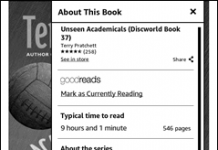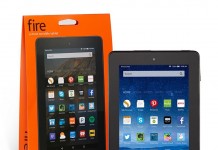 Marketing guru Seth Godin has made a blog post listing a number of interesting suggestions to Amazon for how to win the e-book war. He suggests that Amazon should concentrate on price and come out with a stripped-down $49 “paperback” Kindle, that they could then give away free with purchase of a certain number of Kindle books, or with signing up for an e-book club.
Marketing guru Seth Godin has made a blog post listing a number of interesting suggestions to Amazon for how to win the e-book war. He suggests that Amazon should concentrate on price and come out with a stripped-down $49 “paperback” Kindle, that they could then give away free with purchase of a certain number of Kindle books, or with signing up for an e-book club.
Writes Godin:
The only way to get authors and publishers to embrace this device is to sell 20,000,000 of them. You either become the best and only platform for consuming books worth buying or you fail. And the only way to create that footprint in the face of an iPad is to make it so cheap to buy and use it’s irresistible.
Godin has long been clueful about e-books. Back in 2001, he gave his book Unleashing the Ideavirus, about marketing via memes, away for free through Peanut Press. (I read it and found it fascinating. I wish I still had the Peanut Press/eReader version, but it has long since vanished from the site. He’s still giving away a PDF of it, though.)
I agree that a $49 e-book reader would be a big advantage for whatever e-book seller is the first to come out with it. At the rate prices are falling overall, it’s probably not more than a year or two away.
Related: Seth Godin on giving away e-books
































Seth is right. Just look at the interest the Kobo eReader generated because of its price point — and that was at $150. We’re already seeing eReaders sink to the $100 mark (although they all seem to be monochromatic LCD screened ones instead of E-Ink). If you could package that eReader with a decent eBook marketplace, again like the Kobo, for $75 or under you’d have a huge hit.
Yep. It’s a brilliant strategy. It’s how Gillette dominated the razor market. They gave away tons of razors and then made a fortune selling cheap, disposable blades. However, getting an ebook reader down to that price point would probably clash with Amazon’s vision of an always-connected reader and they’d probably have to remove some of the nice features like the keyboard.
Seth Godin needs to rethink what he’s saying.
He’s saying that what counts is hardware sales, and then suggests that Amazon give away the hardware. Aside from the illogic there, hardware is increasingly becoming irrelevant. I don’t see Amazon being concerned about being “the best and only platform for consuming books”; I think they want to be the biggest seller of e-books.
The iPad Army are doubtless buying Kindle e-books in mass quantity. Probably some number of times more than they’re buying from Apple’s extremely limited iBooks selection. Amazon is making a small pile of money off of every iPad sold.
As for giving away the e-book of your choice, Godin apparently is blissfully unaware of the Agency Model.
If you ask me—and I know you didn’t—the real threat to Amazon is Google Editions. If that turns out to be anywhere near as big as their big talk, Google’s going to be selling a lot more e-books than Amazon. And at the moment, it sounds like Kindle users won’t be able to buy DRMed e-books from Google Editions, so that’ll take some of the glow off of the Kindle.
A mini kindle (5″ eink) could be built to sell for US$100-129 fairly easily. (Not sure Amazon is *interested* in that price point but it’s clear it *can* be done within the next year.)
How?
1- Take out the keyboard and slip in an onscreen keyboard controlled by an improved 5-way switch.
2- Take out the browser but keep the 3G wireless.
3- Take out the audio system and native PDF support (nearly useless on a 5″ screen anyway).
4- Cut onboard storage to 512MB or so.
5- Cut battery size in half. (Or go with disposable AAs and an extra-cost rechargeable module, like the XBOX Controllers use.)
Basically it would be like a cross between the Sony PRS300, which sells for $150 and under, and the Jetbook Lite which runs $99-129. Since Amazon owns their software and only seem to pay royalties on the TTS and (maybe) PDF support they should be able to get a PRS-300 equivalent for less. The 3G hardware cost is minimal, these days and by taking out the browser the only use for it is book buying.
Remember, Sony and Jetbook are selling at those prices and making some kind of profit off the hardware, whereas Amazon makes money off the books so they can sell at cost. (Or even lower.)
If the Agency model survives/spreads they *could* easily go to $49-79 and blister pack-em all over. Wouldn’t take too many $12.99 sales to rack-in some profit.
On the other hand, I suspect Amazon sees no reason *not* to make a profit on the hardware as well as the books as long as they are happy with their market position.
So far, Nook has come and Amazon has rolled merrily on. Barely took note.
The iPad savior has come and Amazon seems to be rolling merrily on.
Maybe Google will be the great BPH savior that puts Amazon in its place. Maybe.
Or maybe Amazon will keep on rolling merrily along. 😉
As long as they’re happy with their current model they’re not going to play the cheap hardware card; it would bring in too much of the wrong kind of attention, I think.
A couple of months ago I bought a $US30 touch-screen MP3 player, made in China, via eBay. I tested the text display function that is now standard equipment on these iPod knock-offs, and it functioned as usual: that is, it used a monospace font, chopped words in half at the screen boundary, and was very hard to read.
The device broke and I sent it back for replacement. The replacement is physically the same but it has new software: specifically, the text display function now wraps words properly and presents them in easy-to-read white on black in a variable-width font. In one upgrade, over the course of a few weeks, a $30 MP3 player has become a minimal but viable eBook reader. Godin’s paperback Kindle may be closer than we think.
Once again, Seth has hit the nail on the head. It’s almost obvious that the way to get mass acceptance and consumption of any electronic device is to offer a mass-friendly version that can easily be picked up by anyone with even a fleeting interest in reading.
It’s only once a device has become affordable that the market is really opened up. This has been true for the VCR, DVD player, CDs, computers, etc. Of course, there is still a major market for the high-end version, but there must first be a low-end version for comparison.
Thanks for the post. Shared it on my blog! http://ebookreader-ben.com/49-kindle/